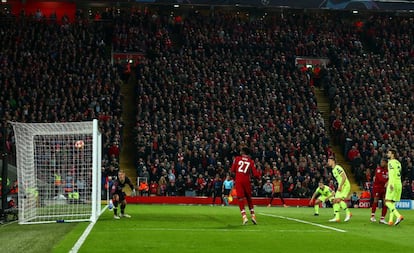How to explain the inexplicable
Liverpool took advantage of the stage fright prompted by Anfield, but Barça helped the situation along with its own fears of the game

Stage fright plus soccer fright
Liverpool made use of stage fright last week. As a ground, Anfield is formidable, because it overwhelms you, scares you and confuses you. But Barça was also suffering from a fear of the game, neglecting the ball, lacking the virtue that sets it apart and the only refuge where it can hide its defects. The team was the victim of such a pasting that after 15 minutes no one from Barça could resist the indiscretion of a close-up. Players with stunned faces and worried looks, who looked like they had just emerged from a shipwreck and had no idea which course to plot. Only Arturo Vidal was still connected to the game, running toward anything that moved. Vidal was in his element, because Liverpool was playing the way it wanted to, and not the way that Barcelona knew. The subjugation was such that in order to score the last goal, Liverpool didn’t even need to ask permission.
It’s called soccer and it has no mercy
A year ago, Roma warned that these things can happen, and a week ago Liverpool had revealed the game that it was going to play at Anfield. They were clear warnings, about which the coaches and players no doubt spoke thousands of times before the game. But soccer can be as slippery as an eel when it comes to making predictions. Without Salah or Firmino, Klopp lost quality, to the extent that he had no other option but do add faith to the equation. Liverpool played worse than in Barcelona, but the huge spiritual energy with which it came out on the pitch was strengthened with goals at the same time as Barça weakened, as if communicating vessels were transferring confidence, conviction, bravery and daring from one team to the other. We won’t spend time looking for reasons, because there are thousands and there are none. Only two opposing states of mind can explain the inexplicable. And not even algorithms go that far.
You can lose and be unforgettable
On Wednesday, soccer outdid itself with another game filled with frenetic emotions. Ajax, with the audacity, daring and energy of its young players, went 2-0 up. And with the irregularity, the inexperience and even the irresponsibility of its young players, lost 3-2. A more grown-up, pragmatic and lucky (how seldom we speak about luck) Tottenham had the virtue of bringing the game to its territory when things were at their worst. It simplified the game, and with a steady stream of goals whipped the match up into the state of hysteria that behooves a team that is trying to stage a comeback. And they managed it in the 95th minute. I would be hard-pushed to name a Tottenham player who I would choose for an ideal Champions League team, something that speaks volumes about Pochettino. Ajax gave us back our childhood, when soccer, without so many neon lights, was everything.
Animal Farm
Sociological behaviors that were stable for decades are degrading soccer thanks to commercial pressures and the logic of globalization: few rich people, many poor. The list is long: supporters are increasingly less fans than they are customers; fewer poor people and more rich people go to the stadiums; the show is less something to be enjoyed on site and more on television; the game itself is less important than the result; and, above all else, soccer is less and less of a game and more and more of a business. We are on the brink of a revolution whereby the big clubs are pressuring UEFA to introduce the law of the henhouse: the hen on the top shits on the one below. This week saw meetings between the different organizations. The ones on top are trying to act like nothing is happening, while those underneath are getting out their umbrellas.
Tu suscripción se está usando en otro dispositivo
¿Quieres añadir otro usuario a tu suscripción?
Si continúas leyendo en este dispositivo, no se podrá leer en el otro.
FlechaTu suscripción se está usando en otro dispositivo y solo puedes acceder a EL PAÍS desde un dispositivo a la vez.
Si quieres compartir tu cuenta, cambia tu suscripción a la modalidad Premium, así podrás añadir otro usuario. Cada uno accederá con su propia cuenta de email, lo que os permitirá personalizar vuestra experiencia en EL PAÍS.
¿Tienes una suscripción de empresa? Accede aquí para contratar más cuentas.
En el caso de no saber quién está usando tu cuenta, te recomendamos cambiar tu contraseña aquí.
Si decides continuar compartiendo tu cuenta, este mensaje se mostrará en tu dispositivo y en el de la otra persona que está usando tu cuenta de forma indefinida, afectando a tu experiencia de lectura. Puedes consultar aquí los términos y condiciones de la suscripción digital.









































